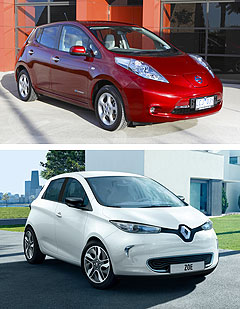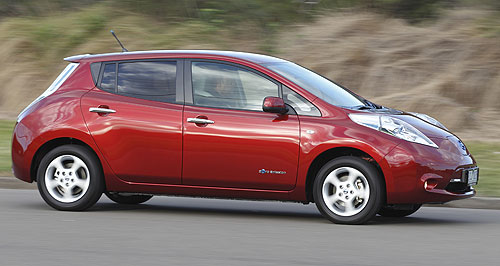Make / Model Search
Future models - Nissan - LeafNext Nissan Leaf to be braverFirst Leaf in autumn: Nissan has just launched the first-generation Leaf in Australia but is already planning the next branch of the family tree. Second-generation Nissan Leaf EV set to move away from conventional design19 Jun 2012 NISSAN is working on a significantly bolder Leaf for the next-generation vehicle, promising more audacious styling inside and out, as well as improved packaging, to match a massive step forward in technology. Due in about 2017, the second version of the pioneering electric vehicle from Japan will espouse a more futuristic design, Nissan promises. The company believes that consumers by then should be more familiar with – and have a far wider choice of – EVs and will therefore expect more than just electrification to keep them interested in the next Leaf. To that end, the next-generation version will break away from the two-box body shape, which dates back to the need to package the classic front-mounted internal combustion engine and drivetrain. Nissan says it deliberately stayed with a conservative silhouette for the first-generation Leaf in order to not scare away consumers already feeling intimidated by the electrification technology. For future versions, it is thought that Nissan is experimenting with electric ‘motor-in-wheel’ technology that uses the wheel hub as part of the motor, driving the wheel directly without any mechanical losses and increased dynamic appeal.  From top: Nisan Leaf Renault Zoe. From top: Nisan Leaf Renault Zoe.Along with the miniaturisation of previously bulky components, this technology will free up considerably more space in future EVs, allowing for more creative and innovative packaging solutions to be explored in the next Leaf. Nissan advanced product strategy manager Francois Bancon said this technical revolution will lead to more emotion in the next-generation Leaf. “Bold design was not the goal (with the existing Leaf),” Mr Bancon told GoAuto at the EV’s Australian launch in Sydney last week. “It was not necessary (because) the electric drivetrain needed to take centre stage. We wanted to give credibility to the technology, we had to reassure people it was the real thing. “(But) there will be a greater need to make a design statement with the next car.” While the 2017 model is still in the early planning stages, Nissan is already busy gathering data from existing Leaf owners to ascertain how to improve the car. Before that, an extensive facelift of the current model – launched globally in late 2010 – is being prepared for release in 2014. Along with a fresh nose and tail, the update is expected to bring better steering response, upgrades to the Leaf’s in-car information systems and better battery efficiency for improved overall range, as well as stronger performance. “Of course, the Leaf will evolve with technology,” said Mr Bancon. Mr Bancon said the Renault-Nissan alliance settled on a ‘C’ segment size for the Leaf in order for it to appeal to as many consumers globally as possible, while the upcoming Renault Zoe EV – a smaller car to be launched at the Paris motor show in September – is specifically aimed at the European market. “The first Leaf was about making a technological breakthrough. That is why the C-segment size was chosen – it is what is most popular in the world. “The Leaf is more for Australia and the US and Japan rather than Europe, and for Europe we will focus on the Zoe.”  Read more18th of June 2012  Nissan 2012 Leaf 5-dr hatchNissan’s – and Australia’s – first mainstream five-seat EV is finally on sale18th of June 2012  First drive: Leaf lands in Oz at lastNissan’s first mainstream electric vehicle is finally on sale, priced from $51,500All future models Alfa Romeo Alfa Romeo Abarth Abarth Alpine Alpine Alpina Alpina Audi Audi Aston Martin Aston Martin BMW BMW Bentley Bentley Chery Chery Brabham Brabham Chrysler Chrysler Chevrolet Chevrolet Cupra Cupra Citroen Citroen DS DS Dodge Dodge Fiat Fiat Ferrari Ferrari Foton Foton Ford Ford Great Wall Great Wall FPV FPV Haval Haval GWM GWM Honda Honda Holden Holden Hummer Hummer HSV HSV Infiniti Infiniti Hyundai Hyundai Jaguar Jaguar Isuzu Isuzu Kia Kia Jeep Jeep Land Rover Land Rover Lamborghini Lamborghini Lexus Lexus LDV LDV Mahindra Mahindra Lotus Lotus Mazda Mazda Maserati Maserati Mercedes-AMG Mercedes-AMG McLaren McLaren MG MG Mercedes-Benz Mercedes-Benz Mitsubishi Mitsubishi Mini Mini Opel Opel Nissan Nissan Peugeot Peugeot Pagani Pagani Proton Proton Porsche Porsche Renault Renault Ram Ram Rover Rover Rolls-Royce Rolls-Royce Skoda Skoda Saab Saab SsangYong SsangYong Smart Smart Suzuki Suzuki Subaru Subaru Toyota Toyota Tesla Tesla Volvo VolvoMotor industry news |
Click to shareNissan modelsResearch Nissan All future models Alfa Romeo Alfa Romeo Abarth Abarth Alpine Alpine Alpina Alpina Audi Audi Aston Martin Aston Martin BMW BMW Bentley Bentley Chery Chery Brabham Brabham Chrysler Chrysler Chevrolet Chevrolet Cupra Cupra Citroen Citroen DS DS Dodge Dodge Fiat Fiat Ferrari Ferrari Foton Foton Ford Ford Great Wall Great Wall FPV FPV Haval Haval GWM GWM Honda Honda Holden Holden Hummer Hummer HSV HSV Infiniti Infiniti Hyundai Hyundai Jaguar Jaguar Isuzu Isuzu Kia Kia Jeep Jeep Land Rover Land Rover Lamborghini Lamborghini Lexus Lexus LDV LDV Mahindra Mahindra Lotus Lotus Mazda Mazda Maserati Maserati Mercedes-AMG Mercedes-AMG McLaren McLaren MG MG Mercedes-Benz Mercedes-Benz Mitsubishi Mitsubishi Mini Mini Opel Opel Nissan Nissan Peugeot Peugeot Pagani Pagani Proton Proton Porsche Porsche Renault Renault Ram Ram Rover Rover Rolls-Royce Rolls-Royce Skoda Skoda Saab Saab SsangYong SsangYong Smart Smart Suzuki Suzuki Subaru Subaru Toyota Toyota Tesla Tesla Volvo VolvoMotor industry news |











Facebook Twitter Instagram